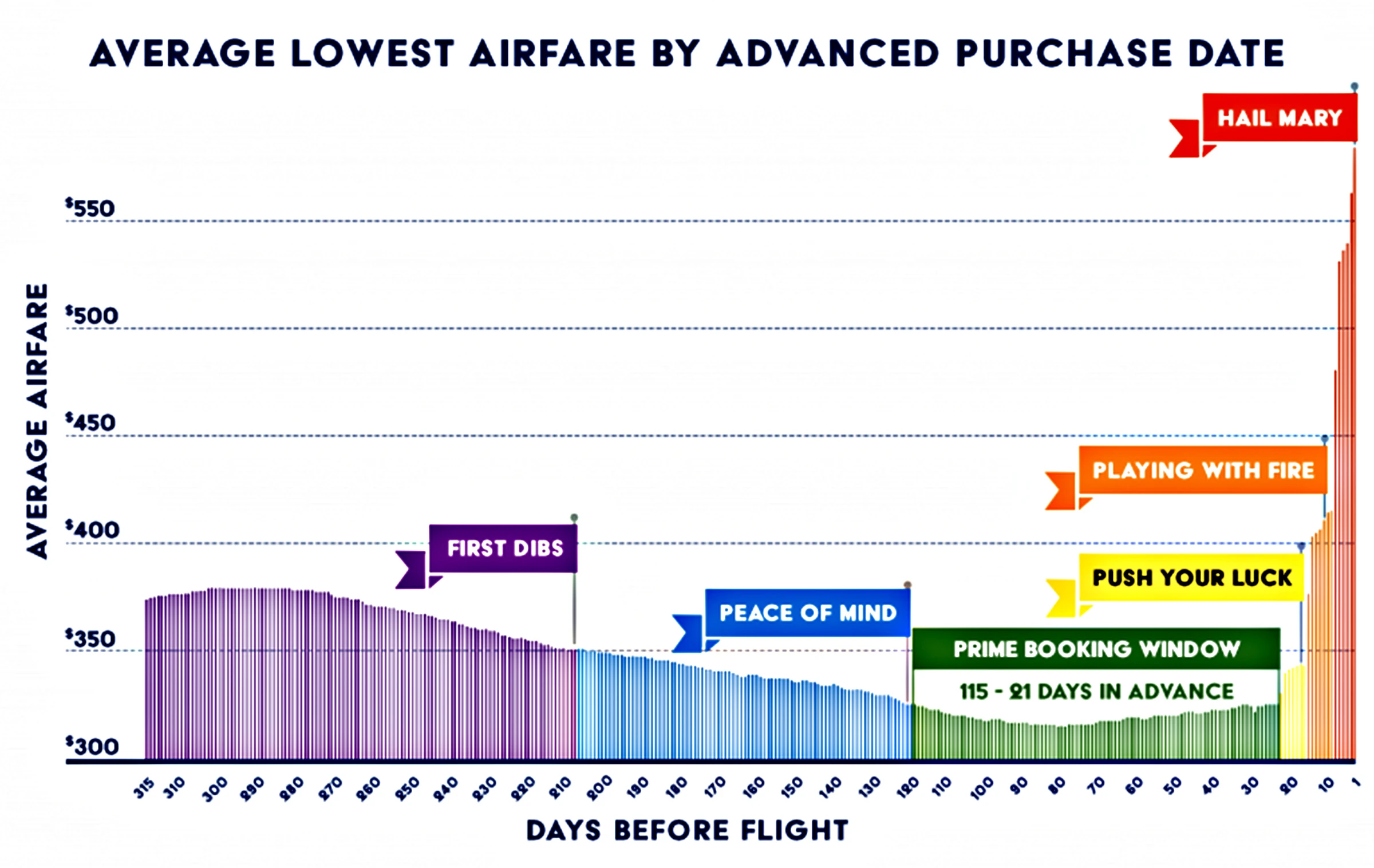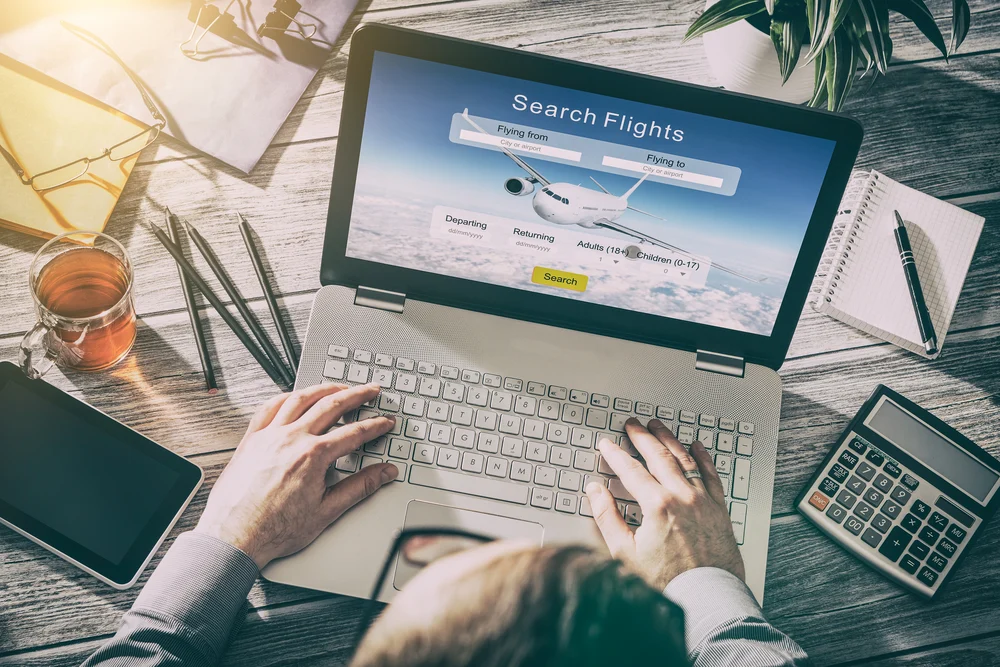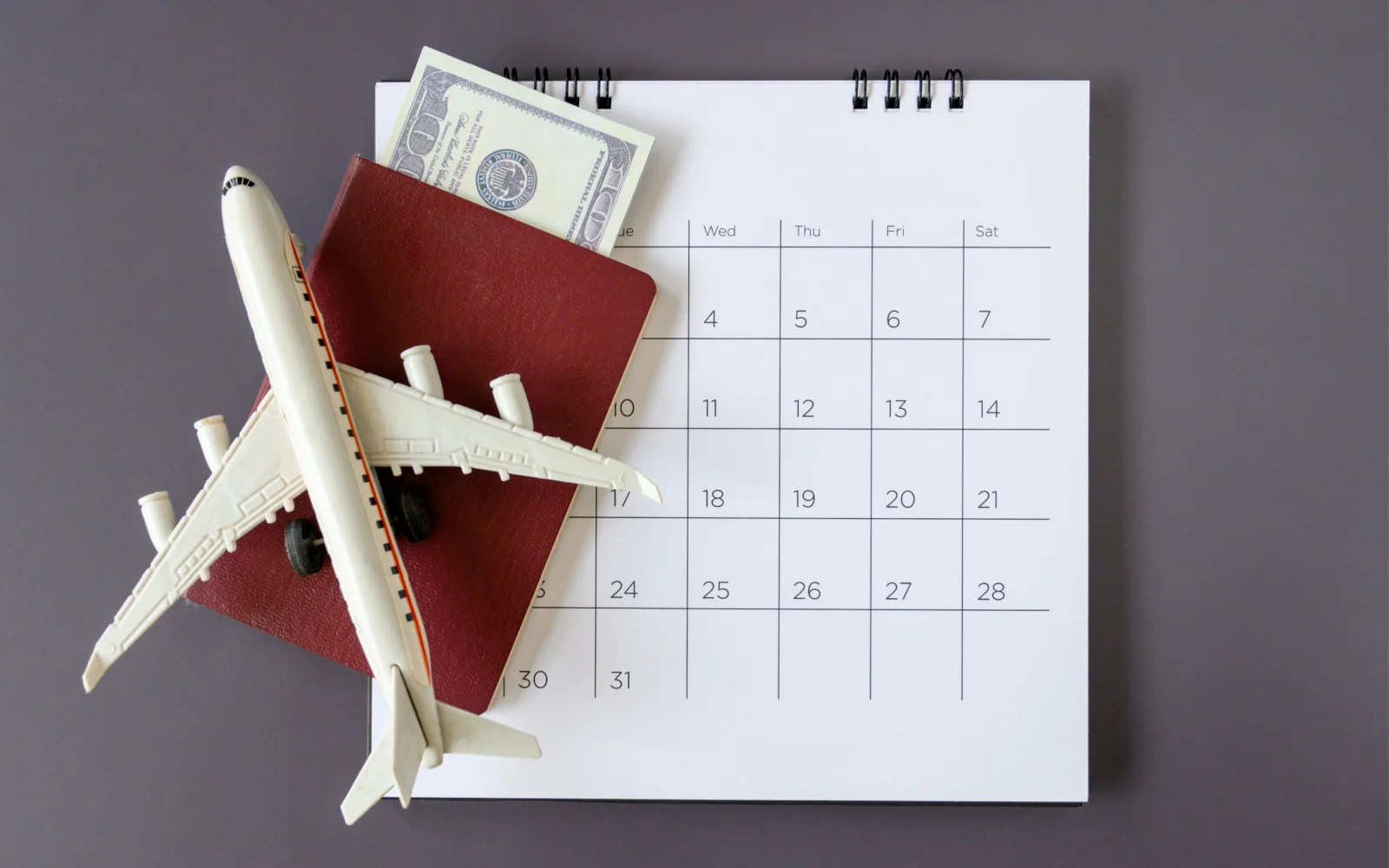Booking your flight at the right time saves you a lot of money and hassle. But how far in advance should you book a flight – months, weeks, or mere days before your planned trip?
We’ve found that booking too far in advance or last-minute tends to be more expensive. There are serious perks to booking your flight somewhere in between – the “sweet spot.”
Let’s talk about how far in advance you should book your flight to nab the best deals and flight availability!
How Far in Advance Should You Book a Flight?
- Booking too far in advance means more expensive flights
- Last-minute flights are also expensive with less availability
- Book flights 1 to 6 months ahead, depending on destination
When you’re planning a trip and know you’ll be flying to your destination, the question of when to book is top of mind.
Booking flights is one of the most important items on your pre-trip to-do list. It has a huge effect on your overall trip budget and planning.
So how far in advance should you book a flight?
Flight booking isn’t an exact science, but there’s enough airline and airfare data floating around to show general windows that tend to offer the best flight deals and availability.
Going.com calls the ideal flight booking range the “Goldilocks Window” because it’s not too early, not too late – it’s just right.
Book too early and you guarantee that you’ll pay the highest price for your plane ticket, though you’ll have the benefit of the most flight and seat availability.
Book too late (we see you, last-minute travelers!) and you’re likely to pay a higher price for your ticket along with fewer open flight and seat options.
You might even get stuck choosing longer, roundabout flights with lots of stops and layovers that cut into your trip time.
The best choice, then, is looking for that Goldilocks Window. It’s the sweet spot between early bird and last minute to book a flight.
The data shows that the sweet spot for flight booking occurs anywhere from 1-3 months in advance for domestic flights. The window for booking international flights is a little broader, ranging from 2-6 months in advance.
We’ll talk in more detail about how far in advance you should book a flight next. You’ll be off to a great start planning your upcoming trip once you can pinpoint the best time to book!
How Far in Advance Should You Book Domestic Flights?
- Book 1-3 months in advance for the best deals and availability
- Book sooner if you’re traveling over holidays or busy seasons
- Book discounted flights ASAP when you get notified
Domestic flights really don’t call for booking far in advance. Generally, you should try to book a flight to a destination within your country anywhere from 1 month to 3 months in advance.
There are no benefits to booking any further than 3 months in advance when you’re flying domestically.
Book sooner than 3 months ahead of time, and you’ll just guarantee higher ticket prices since the airline hasn’t yet sold many (or any) seats on that flight.
Data shows that fares tend to be higher between 106-320 days before the flight, then take a nose dive around day 105 (about 3 months in advance).

Flight booking price data, 2019/Source: CheapAir.com
This is the sweet spot, and if you’re looking for the best prices on airfare with good flight availability, booking 1-3 months in advance is the zone you want to be in!
The exception to the 1-3 month rule for booking domestic flights is if you get notified about a great airfare deal through a flight price tracker like Skyscanner.
If you set up price alerts and learn about a great deal to your destination outside of the 1-3 month window, jump on it!
How Far in Advance Should You Book International Flights?
- Book 2-6 months in advance for the best deals and availability
- Consider booking earlier if your trip overlaps a holiday or peak season
- Jump on discounted flight deals as soon as you receive them
Flying internationally usually calls for earlier booking than domestic flights, but not by too much. In general, plan to book international flights anywhere from 2 months to 6 months in advance.
It won’t do you any good to book further than 6 months in advance – there’s no “early bird” benefit to flight booking.
In fact, most airlines don’t even open their booking window until about 11 months before the flight date. The sooner you try to book an international flight, the more you’ll pay for your ticket.
Airlines generally save their best international airfare deals for the 2-6 month window before a scheduled flight, according to Skyscanner.
You can get lucky and find good deals on international airfare around a month in advance of your trip, but it’s risky because prices usually go up the closer you get to the departure date.
And as your trip date approaches, you risk being forced to book a more expensive flight with several stops or layovers that prolong your travel and shorten your overall time at the destination.
The exception to this rule is if you’ve set up price alerts with a flight price tracker and get notified about a great deal for your destination outside of the 2-6 month window.
Is It Cheaper to Book Flights Far in Advance?

REDPIXEL.PL/Shutterstock
The short answer: No. It’s almost never cheaper to book a flight further in advance than 3-6 months, depending on whether you’re flying domestically or internationally.
It’s usually more expensive to book flights very far in advance – we’re talking more than 3 months out for domestic flights or 6 months in advance for international flights.
Airfare pricing data shows that tickets are more expensive closer to the time the booking window opens. That means you’ll see the highest airfare from 11 months to about 7 months before the scheduled flight.
Sticking with the recommended booking window of 1-3 months in advance for domestic flights and 2-6 months in advance for international flights will reward you with a better price.
Remember the exceptions here: Major airfare deals that can occur anytime (set up price alerts so you don’t miss them), holidays, and popular events like Mardi Gras or music festivals.
If you’ll be traveling over a holiday or to a busy event where lots of people are booking flights at the same time, it does pay to book a little earlier than the recommended window.
Even then, you usually won’t need to move up booking more than 2 additional months in advance.
Are Last Minute Flights Cheaper?

Roman Kosolapov/Shutterstock
Last minute flights are almost always more expensive than booking during the prime window of 1-3 months in advance (domestic) or 2-6 months in advance (international).
In fact, last minute airfare is usually the most expensive – even higher than early bird tickets purchased as soon as the booking window opens.
There are 2 general reasons for the last minute price increases.
- Supply and demand: Airlines have fewer available seats on flights at the last minute (limited supply), so they raise the ticket prices for people buying last minute tickets.
- Business traveler price gouging: Airlines jack ticket prices up last minute to squeeze business travelers who must reach their destination and are flying on their company’s dime.
As supply (available airplane seats) dwindles closer to the departure date, airlines know that those seats will be in higher demand.
People that need to hop on a last minute flight typically have no other choice and airlines know it. They may be business travelers, people traveling to a funeral or family event, or those taking a spontaneous vacation.
As unfair as it may be, knowing how airlines price airfare at the last minute can prevent you from waiting too late to book and ending up paying double or triple the normal price to fly.
What About Flying Standby Last Minute?
If you’ve been around for a while, you may remember the notion of being able to get dirt-cheap flights just by showing up to the airport and waiting for an available seat on a flight to your destination.
Called “flying standby,” this once-useful method doesn’t work anymore as airlines have changed their policies and use algorithms to ensure every flight is as close to fully booked as possible.
Today, the only way you can fly standby is if you’ve already booked a flight and:
- The booked flight was canceled
- You want to fly earlier/later than your booked flight
- You were bumped from the flight
- You missed your flight due to circumstances beyond your control
If it’s at all possible, don’t wait until the last minute to book your flight. Stick with the recommended booking window from 1-3 months (domestic) or 2-6 months (international).
Things to Consider

MMD Creative/Shutterstock
Asking “How far in advance should you book a flight?” is only the tip of the iceberg when you’re planning a trip.
Keep these considerations in mind to make the process a little easier!
- Always set up price alerts. Researching flight prices is part of planning any trip, but if you haven’t been setting up price alerts, now’s the time to start. Price alerts on sites like Skyscanner will notify you when airfare drops for destinations and dates you’ve saved so you won’t have to constantly check prices manually.
- Broaden your flight search. If you can be a bit flexible with your trip departure and return dates, your departure and return airports, and flight criteria (like including flights with stops in your search), you’ll have more luck finding airfare deals when you book during the prime window of 1-3 months out for domestic flights or 2-6 months out for international flights.
- Get travel insurance. Seriously – do it. Travel insurance covers nonrefundable flight tickets and other prepaid travel expenses so you can be refunded in the event something unexpected comes up. A good travel insurance plan is a must if you’re booking flights in advance since anything can change between now and the time of your planned trip.
Frequently Asked Questions

Roman Samborskyi/Shutterstock
People have a lot of questions related to “How far in advance should you book a flight?” and we’re here to provide some answers.
Check out the most frequently asked questions on the subject below to learn more about when to book – and when not to!
How many days before a flight is the best price?
You'll get the best price when you book a domestic flight anywhere from 30 to 90 days before the scheduled flight. For international flights, the best price is offered from 60-180 days in advance.
If you follow the general rule of booking 1-3 months in advance for domestic and 2-6 months in advance for international flights, you'll avoid the highest airfare charged far in advance and very close to the departure date.
How far in advance should I book a flight right now?
It depends on where you're flying. If you're flying domestically, go ahead and start researching prices to book as soon as 1 month or up to 3 months before your planned departure.
If you're flying internationally, you need to book a little further in advance. Aim to book flights no later than 2 months before the planned departure date, but giving yourself a wider window up to 6 months before the departure date works, too.
Are flights cheaper if you book in advance?
Yes, flights are almost always cheaper when you book in advance! The trick is finding the sweet spot to get the best airfare deals when booking in advance.
Flights tend to be expensive close to the time the booking window opens (about 11 months before the scheduled flight), cheaper around 1-6 months before the flight, and most expensive at the last minute (less than 20 days out).
Do flight prices go down on Tuesday?
Google Flights discovered that flight prices do go down about 2% during the midweek, including on Tuesdays. But data shows that Sunday is actually the cheapest day of the week to fly with rates 5% to 20% cheaper than peak flight days (Friday and Saturday).
Do flight prices increase the more you search?
Unfortunately, yes. The New York Times uncovered that airlines use cookies and location data to identify serial flight searchers and can tell when you're serious about booking a flight soon.
The more you search, the more expensive flight prices you're shown.
You can get around this issue by using an incognito browser, a private browser, or a VPN to search for flights.
So, How Far in Advance Should You Book a Flight?
We’ve shared a lot of good info here, but let’s recap with a summary that highlights the really important bits.
You should book a domestic flight at least a month in advance, but you can book it as far as 3 months in advance to get the best prices and open flight/seat availability.
For international flights, book at least 2 months in advance or up to 6 months in advance to unlock the best airfare and flight availability.
Include a little extra wiggle room – no more than a month or two – if you’ll be flying during a busy period, like holidays or big events.
Even if you’re a hard-core planner that loves to take care of business as far in advance as possible, booking flights is one area where it won’t do you any good.
There’s also bad news for procrastinators and spontaneous travelers, since last minute airfare is usually the most expensive you’ll find.
Stick to the recommended window of time to find cheaper fares and ensure there will be plenty of space on the flights you’re checking.
It’s a small step that can make a huge difference in how much you pay for – and how much you’ll enjoy – your trip!



